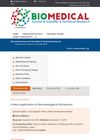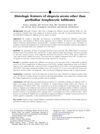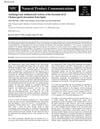 73 citations,
April 2019 in “Experimental Dermatology”
73 citations,
April 2019 in “Experimental Dermatology” The scalp's microorganisms significantly affect hair health and disease.
15 citations,
February 2011 in “Experimental Dermatology” Betamethasone dipropionate reduced skin thickness, fish oil increased it, and combined treatment had no significant effect.
7 citations,
May 2012 in “Journal of veterinary diagnostic investigation” Some young Angus cattle had skin problems due to not enough vitamin A, which got better after they were given more vitamin A.
 4 citations,
June 2022 in “BioMed Research International”
4 citations,
June 2022 in “BioMed Research International” Using mesenchymal stem cells or their exosomes is safe for COVID-19 patients and helps improve lung healing and oxygen levels.
1 citations,
May 2024 in “International Journal of Molecular Sciences” Adenosine receptors could be promising targets for treating inflammatory skin diseases like psoriasis.
 January 2025 in “Indian Journal of Dermatology”
January 2025 in “Indian Journal of Dermatology” Frontal fibrosing alopecia is a challenging hair loss condition with no known cause or definitive treatment.
58 citations,
March 2011 in “Pflügers Archiv für die gesamte Physiologie des Menschen und der Tiere/Pflügers Archiv” Hormones and signaling pathways control sebaceous gland function and could help treat acne.
53 citations,
October 1998 in “The journal of investigative dermatology/Journal of investigative dermatology” Topical calcitriol-analogs can reduce hair loss caused by chemotherapy.
42 citations,
June 2019 in “Aging” 3,4,5-tri-O-caffeoylquinic acid promotes hair growth by activating the β-catenin pathway.
 16 citations,
March 2022 in “Archives of Toxicology”
16 citations,
March 2022 in “Archives of Toxicology” Botulinum and tetanus neurotoxins are better understood now, with updated information on their effects and treatment.
15 citations,
January 2022 in “Immune Network/Immune network” New targeted immunotherapies are improving treatment for inflammatory skin diseases.
10 citations,
October 2018 in “Journal of molecular and cellular cardiology/Journal of Molecular and Cellular Cardiology” The gene NM_026333 slows down aging by affecting the NCX1 pathway and could be targeted for anti-aging treatments.
 4 citations,
November 2019 in “Biomedical Journal of Scientific and Technical Research”
4 citations,
November 2019 in “Biomedical Journal of Scientific and Technical Research” The document concludes that the acoustic coupler SF-001 is good for skin ultrasound, especially on rough body parts, because it's stable and shows blood vessels well.
 86 citations,
August 2021 in “Polymers”
86 citations,
August 2021 in “Polymers” Microneedles are effective for drug delivery, vaccinations, fluid extraction, and treating hair loss, with advancements in manufacturing like 3D printing.
37 citations,
December 2021 in “Cells” Alopecia areata severity and treatment response are linked to specific cytokine levels.
 10 citations,
March 2015 in “PubMed”
10 citations,
March 2015 in “PubMed” Scalp micropigmentation, a cosmetic tattoo technique, is a promising non-surgical treatment for hair and scalp deformities, despite potential complications.
3 citations,
September 2021 in “BioEssays” Dandruff might be caused by changes in how hair follicles naturally release oils and an immune response to this imbalance.
1 citations,
May 2024 in “Applied Sciences” Cordyceps militaris is a promising, cost-effective medicinal fungus with health benefits and efficient production methods.
1 citations,
February 2024 in “Cosmetics” Cannabidiol shows promise as an effective treatment for acne.
 1 citations,
January 2023 in “Revista Da Associacao Medica Brasileira”
1 citations,
January 2023 in “Revista Da Associacao Medica Brasileira” People with seborrheic dermatitis often have lower vitamin D levels.
 January 2025 in “Frontiers in Pediatrics”
January 2025 in “Frontiers in Pediatrics” Baricitinib significantly improved hair regrowth and skin condition in a 14-year-old with alopecia areata and atopic dermatitis.
 October 2020 in “Our Dermatology Online”
October 2020 in “Our Dermatology Online” Chronic bacterial infections of hair follicles can cause ongoing skin inflammation.
 7 citations,
August 2018 in “Journal of Cosmetic and Laser Therapy”
7 citations,
August 2018 in “Journal of Cosmetic and Laser Therapy” Microneedling combined with skinbooster effectively treats striae rubrae, with confocal microscopy confirming collagen changes.
103 citations,
April 2005 in “Experimental dermatology” Prostaglandin F2alpha and related compounds can increase hair growth and darken hair in mice.
 53 citations,
September 2011
53 citations,
September 2011 Other common signs, not just the well-known immune cells around hair bulbs, are important for diagnosing hair loss from alopecia areata.
 12 citations,
October 1995 in “The Journal of Clinical Endocrinology & Metabolism”
12 citations,
October 1995 in “The Journal of Clinical Endocrinology & Metabolism” Skin changes can indicate hormonal imbalances and help diagnose endocrine disorders.
 10 citations,
March 2018 in “Anais Brasileiros De Dermatologia”
10 citations,
March 2018 in “Anais Brasileiros De Dermatologia” More hair loss leads to higher risk of psychosexual disorders, especially in women.
 9 citations,
October 2012 in “Natural Product Communications”
9 citations,
October 2012 in “Natural Product Communications” The essential oil from Chamaecyparis lawsoniana has strong antibacterial and antifungal effects, especially against yeast and Gram-positive bacteria.
 8 citations,
April 2015 in “Transboundary and Emerging Diseases”
8 citations,
April 2015 in “Transboundary and Emerging Diseases” A hospital outbreak of catheter infections in calves was caused by a bacteria from a beef herd, leading to longer hospital stays, more drug use, and calf deaths.
 4 citations,
January 2007 in “Australian Veterinary Journal”
4 citations,
January 2007 in “Australian Veterinary Journal” A horse's sudden hair loss was caused by an allergic reaction to a coat conditioning powder.

















